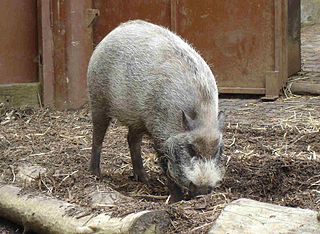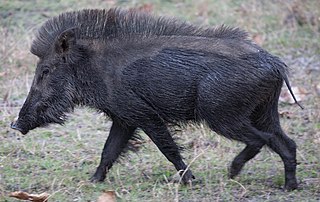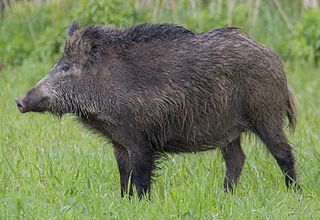The present disambiguation page holds the title of a primary topic , and an article needs to be written about it. It is believed to qualify as a broad-concept article . It may be written directly at this page or drafted elsewhere and then moved over here. Related titles should be described in Wild pig, while unrelated titles should be moved to Wild pig (disambiguation). |
A wild pig may be:
- Eurasian wild boar, Sus scrofa
- Feral pigs, domesticated pigs, Sus scrofa domestica, that have reverted to life as wild animals
- Wild pigs of the Philippines, several of the genus Sus in the Philippines
- Sus (genus), a genus including domestic pig, wild boar, and many Southeast Asian wild pig species
- Suinae, a subfamily which includes Sus, all other existing pig genera, and closely related extinct genera

Suinae is a subfamily of artiodactyl mammals that includes several of the extant members of Suidae and their closest relatives—the domestic pig and related species, such as babirusas. Several extinct species within the Suidae are classified in subfamilies other than Suinae. However, the classification of the extinct members of the Suoidea-the larger group that includes the Suidae, the peccary family (Tayassuidae), and related extinct species—is controversial, and different classifications vary in the number of subfamilies within Suidae and their contents. Some classifications, such as the one proposed by paleontologist Jan van der Made in 2010, even exclude from Suinae some extant taxa of Suidae, placing these excluded taxa in other subfamilies.

Suidae is a family of artiodactyl mammals which are commonly called pigs, hogs or boars. In addition to numerous fossil species, 17 extant species are currently recognized, classified into between four and eight genera. The family includes the domestic pig, Sus scrofa domesticus or Sus domesticus, in addition to numerous species of wild pig, such as babirusas and warthogs. All suids, or swine, are native to the Old World, ranging from Asia to Europe and Africa.
- Sus (genus), a genus including domestic pig, wild boar, and many Southeast Asian wild pig species

The wild boar, also known as the wild swine, Eurasian wild pig, or simply wild pig, is a suid native to much of Eurasia, North Africa, and the Greater Sunda Islands. Human intervention has spread its distribution further, making the species one of the widest-ranging mammals in the world, as well as the most widely spread suiform. Its wide range, high numbers, and adaptability mean that it is classed as least concern by the IUCN and it has become an invasive species in part of its introduced range. The animal probably originated in Southeast Asia during the Early Pleistocene, and outcompeted other suid species as it spread throughout the Old World.

The feral pig is a pig living in the wild, but which has descended from escaped domesticated individuals in both the Old and New Worlds. Razorback and wild hog are American colloquialisms, loosely applied to any type of feral domestic pig, wild boar, or hybrid in North America; pure wild boar are sometimes called "Russian boar" or "Russian razorbacks". The term "razorback" has also appeared in Australia, to describe feral pigs there.
The Philippines has four endemic species of wild pigs. This makes the Philippines unique in having arguably the largest number of endemic wild pigs. Two separate populations of unstudied wild pig species have been reported on the islands of Tawi-Tawi, and Tablas.
| This disambiguation page lists articles associated with the title Wild pig. If an internal link led you here, you may wish to change the link to point directly to the intended article. |








